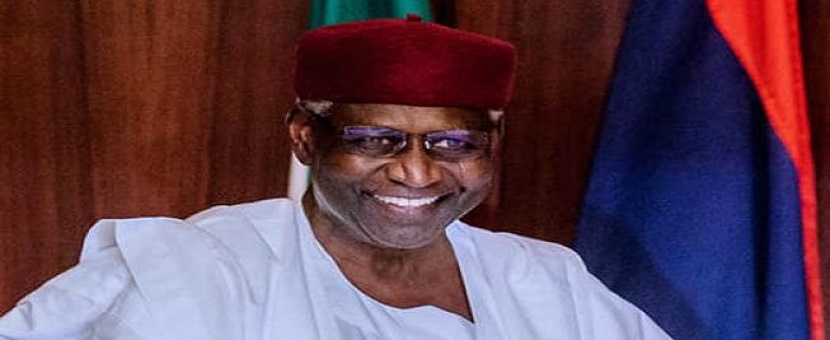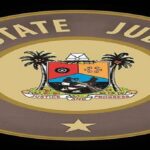The Late Abba Kyari (CoS)
The Late Abba Kyari OON (23 September 1952 – 17 April 2020) was an accomplished Nigerian businessman and lawyer who served as Chief of Staff (CoS) to the President of Nigeria, President Muhammadu Buhari, from 27 August 2015 to 17 April 2020. He was often mistaken for other popular Abba Kyaris (like the Nigerian Army Brigadier who was a former Governor of the now defunct North-Central State, Nigeria) in Nigeria.
The Late CoS served President Buhari in loyalty and passion. He possibly ranked as the most trusted of all persons working for the President in any capacity or designation. The President acknowledged this fact in his emotional tribute to his former CoS. Senator Shehu Sani in his tribute said in artistic style:
Abba Kyari; The President has lost a trusted & loyal friend. A man who took the bullets of his master with smiles, calmness & silence. We knew his cap & his colors but never his mind or his own side of his story. He will be missed as a Punchman or a punch bag. RIP AK.
The above brief description (by one of the few trusted Nigerian politicians, a statesman and an activist) may run into many pages if it were to be thoroughly analysed. While I do not undertake to carry out that analysis, some of the strong points made is captured below as we go.
The news of the death of the Late CoS was, unfortunately, greeted with more celebration across the country than eulogy. This has thrown up arguments from different quarters as some challenged the propriety of speaking ill of the dead. Others have argued that speaking ill of the dead only connotes lying against the dead only. Thus, it is not out of place if the castigation of the dead is founded on facts and truth. Others contend that it is a pure exercise of freedom of expression to elect whether to “attack” or eulogise the dead. Some others were of the view that the “attack” on the Late Abba Kyari was not a function of general detest for government officials and those in the corridors of power. This is because Nigerians have been seen eulogising some deceased officials like the Late Prof. Dora Akunyili (former Director-General of National Agency for Food and Drug Administration and Control (NAFDAC) from 2001 to 2008 and Minister of Information and Communications from 2008 to 2010).
The Office of Chief of Staff
A “Chief of Staff”, as the title goes, is the head of all staff working in an organisation or for a person. The designation has several meanings depending on the context in which it is used. In the armed forces, a CoS is “the ranking officer of a staff in the armed forces serving as principal adviser to a commander” (Merriam-Webster); or “an officer of very high rank in the armed forces or a leader in a large organization” (Cambridge Dictionary).
There is nothing in the Constitution of the Federal Republic of Nigeria 1999 (as amended) that expressly created the Office of Chief of Staff either for the President or the Governors. However, the Constitution provides us a pointer. Section 171 (1) and (2)(e) gives the President the power to appoint (or remove) any person to “Any office on the personal staff of the President.”
Section 171(5) further provides that any appointment made in this regard shall be at the pleasure of the President and shall cease when the President ceases to hold office. See Section 171(2) for other appointments that share the same fate. Section 208(1), (2) and (5) contain similar provisions for State Governors.
The Office of the Chief of Staff perfectly fits into Any office on the personal staff of the President. In other words, all personal staff appointed by the President are recognised by the Constitution including the office of the CoS.
Interestingly, the Constitution did not accord any further or special regard to the personal staff of the President. Expectedly, their duties were not specified in the Constitution. The personal staff of the President including his CoS constitute what is commonly described as “Kitchen Cabinet”. The Late Abba Kyari was the Head of that Cabinet. In this capacity, his traditional role was akin to that of a personal assistant; he was responsible for planning President Buhari’s schedules and coordinates correspondences for his attention. He sometimes collaborates with other personal staff of the Presindent like the State Chief of Protocol.
The running of the real affairs of the Executive arm of Government is the business of the President, the Vice-President and the Ministers. The Constitution provided for the creation of such offices of Ministers of the Government under Section 147 and provides for the executive responsibilities of the Ministers under Section 148.
Allegations against the Late Abba Kyari
Aside the “attack” from those who might have personal vendetta with the Late CoS, the totality of the “attacks” from many quarters centre around the allegation that the Late CoS was a god in Aso Rock. The Head of the Personal Staff of any President will surely have the ears of the President. A man who has the ears of the President is like a man who has the ears of the King. People will naturally bow to him, no matter his designation. This was the case with the Late Kyari. As a matter of fact, President Buhari did not mince words when on 20 August 2019 – at the Presidential retreat for ministers – designate, held in Abuja – he directed (like he did in 2015) as follows:
…All communications and appointments from you (Ministers) to the Presidency should be routed through the Office of the Chief of Staff as is normal in this presidential system.
So, almost everyone, including the Ministers, go through the Late Abba Kyari in the quest to access the President. The Late CoS was like the Wall of China, heavily fortified.
Beyond enjoying the unshaking support and trust of President Buhari, there are facts supporting the allegation that the Late CoS took advantage of his education, wealth of experience, learning and exposure to find his way into real governance and activities of Government. This was not a mere allegation as there are facts that support the conclusion. For instance, the Late CoS was reported to have travelled to Germany to seek solutions to Nigeria’s electricity perennial problem. There was no report on whether the Minister of Power was on the train. Also, he was said to have played key role in $300m Abacha loot return to Nigeria. On 4 November 2019, President Buhari signed the Offshore (and Inland Basin Production Sharing Contract) Bill into law. There were indications that the Late Abba Kyari was part of those who pushed for the all-important piece of legislation. The Late CoS was said to be on the forefront to lead Nigeria’s oil sector reform. These are few examples. Another category of instances relates to the “misfortunes” of some top government officials who lost their positions in circumstances not devoid of the mention of the name of the Late Abba Kyari.
One of the members of the Kitchen Cabinet, Alhaji Mamman Daura was reported to have stated in his tribute that:
In point of intellect, he [the Late Abba Kyari] stood above all Ministers and Special Advisers in this Government.
The above is a strong indication on the philosophy that propels the Late CoS. It appears to underscore the general belief and allegation that the Late Kyari was the leader of the so-called “Cabal” that hijacked the Federal Government, whether or not to the pleasure of the President.
There is no evidence to challenge the true intentions of the Late CoS in the role he either chose to play or was assigned to play by his master, if any. Thus, whether he acted in good faith and in the best interest of the nation is not the issue.
There is a saying that what is worth doing, is worth doing well. Another goes thus – that whenever a supposedly good move is greeted with lots of opposition, something is definitely not right somewhere. Apparently, regarding the exalted position of the Late Kyari, he would be fingered for anything and everything – good or bad.
Conclusion
It was never contemplated by the Constitution that a personal staff (or Chief of Staff, if you like) will become so powerful that he arguably ranks next to the President (or Governor); powerfully influences the exercise of executive powers, and sometimes perceived as the President himself! Whoever elevates the Office of CoS to a status beyond a mere personal staff will definitely offend the Constitution to some degree, cause further problems in governance and set the people against him.














